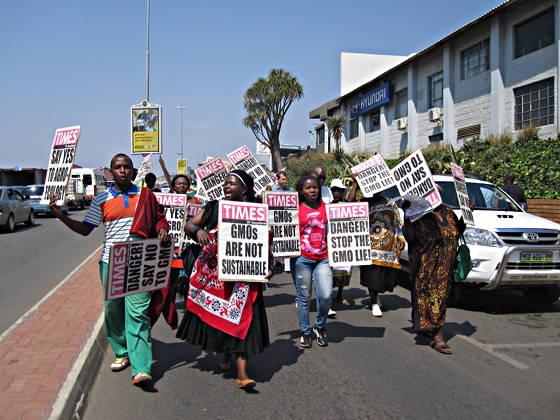Latest Resources

2 August 2024
The decline of FISPs in Malawi – debt, corruption and hunger
What future for smallholder farmers and realising agroecology?

26 April 2019
Undermining farmers’ rights and seed systems: Why the EAC seed and plant varieties bill must be d...
In this vlog, African Centre for Biodiversity’s (ACB’s) Sabrina Masinjila, based in Tanzania, speaks about the East African Community Seed and Plant Varieties Bill, 2018 and some of the concerns related to the Bill, as more fully set out in a detailed report and summary. As described in the vlog and our detailed report, Concerns […]

28 March 2019
Cyclone Idai’s warning – Shift to agroecological systems that work with nature or suffer more dev...
Ranked as one of the worst tropical storms on record to hit Africa, Cyclone Idai made landfall in Beira on Thursday 15 March, before lacerating its way across central Mozambique and then on towards neighbouring Malawi and Zimbabwe. Heavy rains, flooding and storm damage has resulted in devastation on a vast scale. It is estimated […]

10 September 2018
Report from SADC regional farmer speak out on farm input subsidy programmes
Rural Women’s Assembly (RWA) and African Centre for Biodiversity (ACB) jointly hosted a meeting of farmers and civil society organisations (CSOs) in August 2018 to share views and experiences on farm input subsidy programmes (FISPs) and public sector support for agroecology in the region. About 140 participants from Namibia, South Africa, Zimbabwe, Mozambique, Zambia, Malawi, […]

28 May 2018
Biosafety Indaba eSwatini: Unclear motives following approval to cultivate Bt cotton, despite dis...
The news that the Swaziland Environmental Authority (SEA) had authorised the importation and commercial release of Bt cotton seeds came as a huge shock to the African Centre for Biodiversity (ACB). It meant that ACB had to reconsider its earlier acceptance of an invitation by SEA to attend a National Biosafety Indaba on 22 May […]

18 October 2017
The GMO crisis in Swaziland
Swaziland is under enormous pressure to introduce genetically modified organisms (GMOs) into the country’s farming system. This pressure is coming not only from Monsanto but also from farmers and some sections of the public who have been fed a great deal of misinformation and hype by the pro-biotech machinery. The farmers, acting on incomplete and […]

18 July 2017
GM Cotton push in Swaziland: Next target for failed Bt cotton
This paper examines the application of the Bt cotton field trials currently underway in Swaziland. This is situated within the broader wave of GM application and trials across the continent, along with the weakening of national biosafety regulations, as part of the GM push across Africa. This paper is based on research on the Swaziland […]

5 October 2016
Farmer-managed seed systems in Dowa, Malawi: A legacy of eroded confidence and agricultural diver...
This report is the product of field work conducted by ACB and Kusamala Institute for Agriculture and Ecology in Dowa district in central Malawi. The objective of the research was to deepen our understanding of the role of farmer seed varieties in smallholder production systems that have come under heavy pressure from concerted Green Revolution […]

13 July 2016
Soil fertility: Agroecology and not the Green Revolution for Africa
This synthesis report summarises ACB’s research on the Green Revolution push in Africa, based on fieldwork conducted in Malawi, Mozambique, Tanzania, Zambia and Zimbabwe over the past three years. The research indicates that the promotion of synthetic fertiliser use in Africa is only a short-term fix for enhancing soil fertility on the continent. In the […]

20 June 2016
Green Revolution dead-end in Malawi: Two case studies— AGRA’s Pigeon Pea Project and Malawi’s Agr...
This report that the Alliance for a Green Revolution’s ( AGRA’s) sponsored pigeon pea project in Malawi was a dismal failure and its agrodealer project had some major and fundamental weaknesses. The AGRA pigeon pea project and the Malawi Agro-dealer Strengthening Programme (MASP) were implemented under AGRA’s Soil Health Programme (SHP) and the Programme for […]
